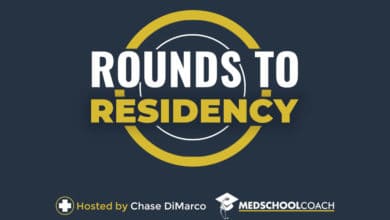Dr. Amelia Bueche, founder & program director at Coaching for Institutions, talks about the field of osteopathic medicine, the concept of worthiness, and the application of osteopathic philosophy beyond the clinical setting.
- [02:52] What is osteopathic medicine?
- [05:52] The concept of worthiness in medicine
- [09:01] The ‘and’ statement in medicine
- [12:30] How to properly leverage the ‘and’ statement
- [16:05] The ‘I am’ exercise
- [19:36] The application of osteopathic philosophy beyond the clinical setting
- [23:06] The main difference between osteopathic manipulation and other forms of medicine
What is Osteopathic Medicine?
A Doctor of Osteopathic Medicine (D.O.) is a licensed physician who aims to improve a person’s general health and wellness by treating the whole person, not just the condition ailing them. This branch of medicine concentrates on the interrelated unity of all body systems working together to heal in times of illness. This may include osteopathic manipulative medicine, which involves stretching, massaging, and moving the musculoskeletal system. D.O.s typically analyze more than just a patient’s symptoms to understand how lifestyle and environmental factors impact general health. Furthermore, the majority of active D.O.s practice in the primary care specialties of internal medicine, family medicine, and pediatrics.
The Concept of Worthiness in Medicine
When it comes to self-development, one of the most talked-about topics is worthiness– a topic that becomes even more interesting in the medical field. Students are drawn into medicine for different reasons. You work hard, get into medicine and finally reach your goals. But is that all it takes to archive a sense of worth? According to Dr. Amelia, many students and doctors suffer from an arrival fallacy. Medical students think they’ll be happy when we complete medical school. But then there’s residency, and the goalpost keeps moving, frustrating our happiness.
On the other hand, medicine selects a lot of high achievers. So, what happens to students who never get chosen? When people miss out on something, say matching, a sense of unworthiness starts to creep in. And it can be frustrating, which is okay. As long as you did your best, there is no shame in missing out on a goal. Dust yourself up and keep pressing.
How to Properly Implement the ‘And’ Statement
Setting achievable goals is a simple and repetitive route toward larger, more ambitious goals often referred to as dreams. However, goal accomplishment requires both achievement and failure. And that’s where most people, especially med students, go wrong. It’s important to appreciate both winning and losing when working on something. If you let the fear or the effects of failure control you, you are more likely to give up moving forward. Dr. Amelia advises that med students should chase their dreams and if things don’t work out as planned that’s where the ‘and’ statement comes in. For example, I failed to match, AND I’m going to try again next year. In so doing you return the power back towards yourself.
Check out Dr. Amelia’s article in KevinMD.com and her websites Osteopathic Life and Coaching for Institutions
Sign up for a Free Coaching session with Chase DiMarco, sponsored by Prospective Doctor! You can also join the Med Mnemonist Mastermind FB Group today and learn more about study methods, memory techniques, and MORE! Do check out Read This Before Medical School. Like our FreeMedEd Facebook page and find our Medical Micro Course, Blog posts, and Podcasts at FreeMedEd.org! Feel free to Email any Questions or Comments.
